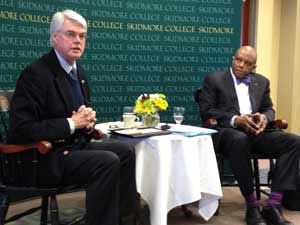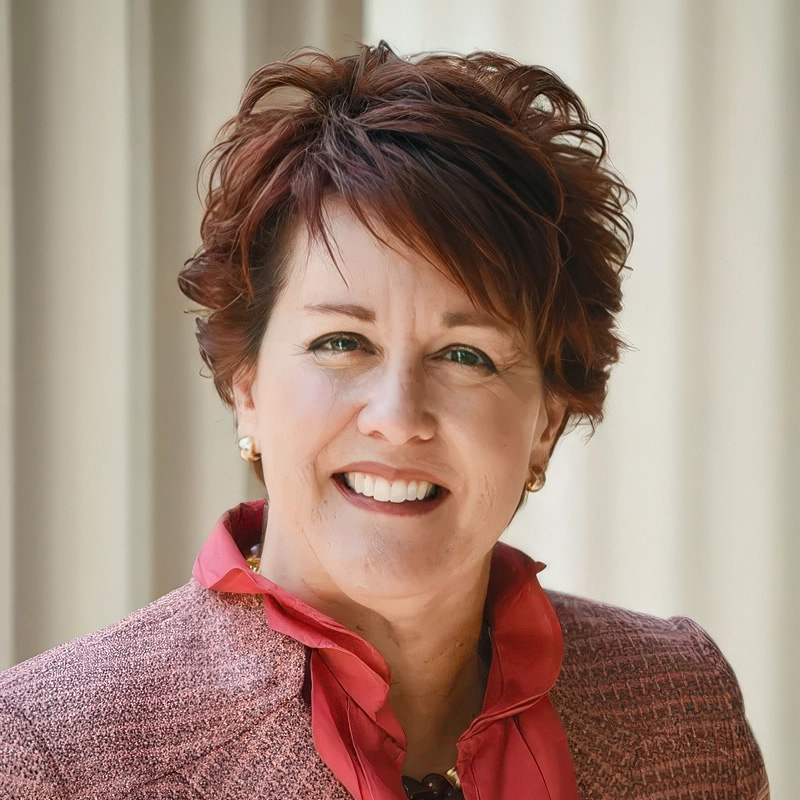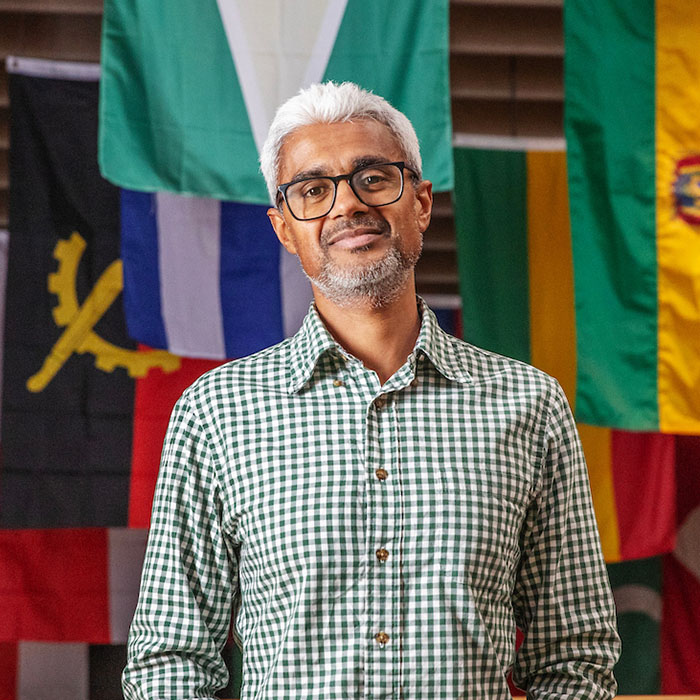Skidmore 2025
The College’s current ten-year Strategic Plan will expire in 2015. It’s time to start work on a new one.
A two-year effort to develop a new strategic plan started officially on Friday in Murray-Aikins Dining Hall.
About 150 faculty and staff attended a day-long “Academic Summit” organized jointly by the President’s Office, DOF/VPAA Office, Faculty Executive Committee (FEC), and Committee on Educational Planning and Policy (CEPP). It explored such topics as creative pedagogies, e-learning, faculty workload, academic rigor, the admissions picture, and the transition of students from college to the workplace and graduate school.

Skidmore President Philip A. Glotzbach and Wheaton College
President Ronald A. Crutcher framed the day's discussions with
a wide-ranging exchange.
In addition to starting the process of considering the next Strategic Plan, the day-long meeting aimed simply at strengthening the College’s sense of community, said Beau Breslin, dean of the faculty and vice president for academic affairs. “We’re exploring new and creative ways to bring members of the campus community together to learn from one another and generate innovative ideas for moving Skidmore to even greater heights.”
Implemented in 2005, the College’s current Strategic Plan will reach its expiration date in 2015. “That makes this a propitious moment to have this conversation,” said President Philip A. Glotzbach, whose wide-ranging exchange with Wheaton College President Ronald A. Crutcher framed the day’s discussions.
“It’s a time for reflecting on what we’ve achieved and where we want to go next,” said Glotzbach. “What do we want to carry forward? What is our place in the world of national liberal arts colleges, and what is the contribution that we expect our students to make to the world?”
Noting how polarized public discourse has become on guns, climate change, and myriad other issues, Glotzbach suggested that liberal education “ought to be the engine that helps a democracy do the work of talking across difference – whether it’s political difference, ideological difference, racial and ethnic difference, or religious difference.”
“What are we doing to help our students talk across real difference? Not to take a position and fire a salvo across the net and expect the other side to respond, but to actually find ways of engage in conversation and find points of agreement. It’s a very complicated and difficult thing to do. I don’t have the answer, but I think it’s something we have to take seriously.”
Equally important, noted Glotzbach, is teaching students how to use empirical and scientific evidence.
“For example, what are we to make of the recent report that 2012 was the hottest year on record in the U.S.? Some scientists say we should cool the planet by using various techniques to increase the reflectivity of clouds. Should we? For our students to contribute meaningfully to public discussions on such issues, they have to be well acquainted with the nature of scientific evidence.”
Crutcher pointed at two successful models for teaching students how to talk across differences. At Wheaton College, he has created “dialogue action teams” to encourage open-ended discussions of issues among faculty, staff, and students. Also, as a member of the board of the Posse Foundation, a youth leadership development program, he has seen effective “PossePlus Retreats”: weekend workshops in which students are challenged to tackle important national and campus issues, such as race, meritocracy, and class.
As a third model, Glotzbach praised an Israeli journal, Common Knowledge, for its approach of bringing together Israeli and Palestinian young people to explore solutions to conflicts beyond their own lands, such as the situation in Northern Ireland.
“The College’s long tradition of mind and hand fits wonderfully with what you’re both saying,” observed former Skidmore President David Porter in the discussion following their presentations. “It’s rooted in the most basic principles on which this school was founded.”
Six members of the faculty and staff laid the groundwork for fruitful small-group discussions by outlining some of the central challenges the college faces. Mary Lou Bates, dean of admissions, noted a dramatic increase in applications for the Class of 2017 and underscored the need to continue to work hard, particularly in the area of financial aid, to build a strong and diverse applicant pool. Joshua Ness, associate professor of biology, shared the results of a survey of the faculty, conducted by CEPP last year and engineered by Mimi Hellman, associate professor of art history, regarding the Transitions and Transformations initiative. Susan Walzer, professor of sociology, discussed challenges faculty face in balancing their work, family and social lives. Michael Arnush, associate professor and chair of classics and chair of CEPP, shared data indicating a continuing trend of grade inflation over the last decade. Erica Bastress-Dukehart, associate professor of history department and director of faculty development, outlined the commitment of the faculty to creative pedagogies. Finally, Leo Porter, assistant professor of mathematics and computer science, employed a podcast to address some of the potential benefits and challenges of e-learning.
Following the presentations, Summit participants fanned out around the room, choosing topics of greatest interest and engaging in lively discussions on those issues. Brief reports to the entire assembled group then followed, and Barbara Black, professor of English and chair of FEC, moderated a vibrant discussion on the full range of challenges and opportunities the College faces. The levels of engagement and cooperation were high, and the spirited conversations over the course of the day will most likely inform the development of the next Strategic Plan.


